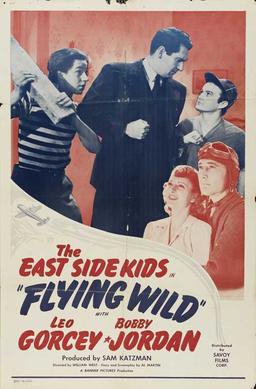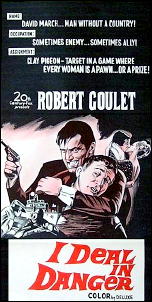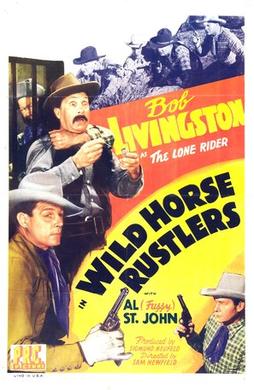
Robert Martin Culp was an American actor and screenwriter widely known for his work in television. Culp earned an international reputation for his role as Kelly Robinson on I Spy (1965–1968), the espionage television series in which co-star Bill Cosby and he played secret agents. Before this, he starred in the CBS/Four Star Western series Trackdown as Texas Ranger Hoby Gilman in 71 episodes from 1957 to 1959. The 1980s brought him back to television as FBI Agent Bill Maxwell on The Greatest American Hero. Later, he had a recurring role as Warren Whelan on Everybody Loves Raymond, and was a voice actor for various computer games, including Half-Life 2. Culp gave hundreds of performances in a career spanning more than 50 years.

Flying Wild is a 1941 film directed by William Beaudine under the pseudonym "William West" as the fifth installment of the East Side Kids series which eventually totaled 22 films. The film is the team's first one in the spy film genre.

Invisible Agent is a 1942 American action and spy film directed by Edwin L. Marin with a screenplay written by Curt Siodmak. The invisible agent is played by Jon Hall, with Peter Lorre and Sir Cedric Hardwicke as members of the Axis, and Ilona Massey and Albert Basserman as Allied spies.

Berlin Express is a 1948 American drama film starring Robert Ryan, Merle Oberon and Paul Lukas, and directed by Jacques Tourneur.

Carry On Spying is a 1964 British spy comedy film directed by Gerald Thomas. It is the ninth in the series of 31 Carry On films (1958–1992).

Murder on the Orient Express is a 1974 British mystery film directed by Sidney Lumet, produced by John Brabourne and Richard Goodwin, and based on the 1934 novel of the same name by Agatha Christie.

Operation Crossbow is a 1965 British espionage thriller set during the Second World War. This movie concerns an actual series of events where British undercover operatives targeted the German manufacturing facilities for experimental rocket-bombs.

Fly-by-Night is a 1942 American thriller/screwball comedy film directed by Robert Siodmak, starring Richard Carlson and Nancy Kelly. It was Siodmak's second American film. The film finds a young doctor tracking down a Nazi spy ring in an effort to clear his name after being charged with the murder of a scientist.
Hans Heinrich von Twardowski was a German film actor.

Sherlock Holmes in Washington (1943) is the fifth film in the Basil Rathbone/Nigel Bruce series of Sherlock Holmes movies. The plot is an original story not based on any of Sir Arthur Conan Doyle's Holmes tales.

The Adventures of Tartu is a 1943 British Second World War spy film directed by Harold S. Bucquet and starring Robert Donat. It was a morale booster of the era portraying Nazis as highly corruptible due to their desire to seduce women and to gain personal advancement.

The Secret Code (1942) was the 19th serial released by Columbia Pictures. It features the masked hero "The Black Commando" facing Nazi saboteurs, inspired by Republic Pictures' successful Spy Smasher serial of the same year. The chapters of this serial each ended with a brief tutorial in cryptography.

Submarine Alert is a 1943 American film directed by Frank McDonald, produced by Pine-Thomas Productions and released by Paramount Pictures. The film stars Richard Arlen, Wendy Barrie, Nils Asther, Roger Pryor, Marc Lawrence and Ralph Sanford.

Murder in the Clouds is a 1934 American action film dealing with aviation. The film stars Lyle Talbot and Ann Dvorak, and is directed by D. Ross Lederman. Although standard formula "B" film fare, it was notable as the screenplay and original story was written by Dore Schary as a freelance writer, during one of his periods when he was fired from a more prestigious film job. Schary was a director, writer, producer and playwright who later became head of production at Metro-Goldwyn-Mayer, and eventually president of the studio. Equally important on Murder in the Clouds was the work of Elmer Dyer who had become a preeminent aviation cinematographer.

Sky Murder is a 1940 detective film starring Walter Pidgeon as detective Nick Carter in his third and final outing for MGM as Nick Carter. The film was part of a trilogy based on original screen stories starring the popular literary series character. In the heightened tensions prior to World War II, Hollywood produced many films in the spy film genre such as Sky Murder.

I Deal in Danger is a 1966 American DeLuxe Color spy film compiled from the first four episodes of a television series, Blue Light, which aired on ABC-TV in early 1966. Directed by Walter Grauman, it starred Robert Goulet as David March, an Allied spy in Nazi Germany during World War II. He is aided by a French agent, Susanne Duchard, played by Christine Carère.

Remember Pearl Harbor is a 1942 American propaganda film directed by Joseph Santley and written by Malcolm Stuart Boylan and Isabel Dawn. The film stars Don "Red" Barry, Alan Curtis, Fay McKenzie, Sig Ruman, Ian Keith and Rhys Williams. Remember Pearl Harbor was released on May 18, 1942, by Republic Pictures.
Hell's Bloody Devils is a 1970 American film directed by Al Adamson and written by Jerry Evans.

The Invisible Man is a film series by Universal Pictures. The series consists of The Invisible Man, The Invisible Man Returns, The Invisible Woman, Invisible Agent, The Invisible Man's Revenge and Abbott and Costello Meet the Invisible Man. The film series borrows elements from H. G. Wells's novel The Invisible Man, but it focuses primarily on the idea of a serum that causes someone to go invisible and its side-effects.

Wild Horse Rustlers is a 1943 American Western film directed by Sam Newfield and written by Joseph O'Donnell. The film stars Robert Livingston as the Lone Rider and Al St. John as his sidekick "Fuzzy Jones", with Lane Chandler, Linda Leighton, Frank Ellis and Stanley Price. The film was released on February 12, 1943, by Producers Releasing Corporation.

















